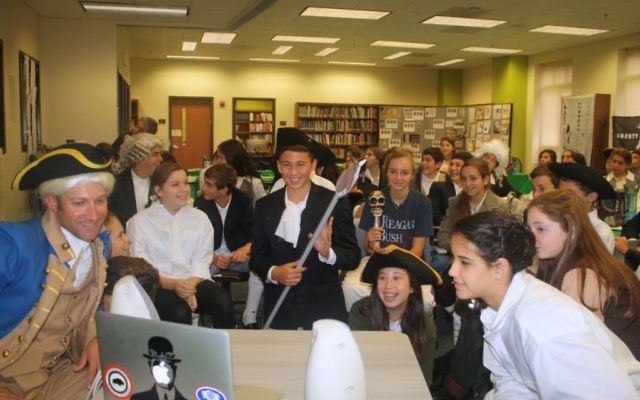Davis Re-Creates Continental Congress — With Skype

By R.M. Grossblatt
Fifty-eight Davis Academy eighth-graders re-enacted the Second Continental Congress on Thursday, Sept. 24, after two weeks of studying the causes of the Revolutionary War.
Delegates in costume — 56 of them, representing the number from the 13 colonies at that Congress — debated with one another and skyped with fifth-graders in other states. Skyping might have shocked delegate Benjamin Franklin, but social studies teacher Matthew Barry implemented it three years ago so his students could teach others across the nation.
This is the 11th year that Barry and his students have re-created the Second Continental Congress, which produced the Declaration of Independence. Beginning the first few years with a two-hour presentation, the project now takes most of a school day and is a highlight of the social studies curriculum.
The delegates met in the school cafeteria for a continental breakfast the morning after Yom Kippur. Because of British boycotts, food was limited, Barry said.
They then moved to the media room, decorated with banners, quills and faux candles. Only one delegate, dressed in a red coat with gold buttons, was a loyalist, and he stood on a chair to argue his case against war.
Most of the convention was led by the students, but Barry, in a white wig, blue coat and tricorner hat, sat near the computer set up for Skype. A delegate would stand before the computer, state his name and the colony he represented, and answer a question posed by fifth-graders, first from Wisconsin, then Delaware and finally a charter school in Illinois.
After Delaware signed off, Barry shared with his students that the fifth-graders in that public school come from a lower income area.
“They’re probably going to go home tonight and share their excitement with their families,” he said.
The Davis eighth-graders conferred at each colony’s table on issues such as how to raise a militia, then stood to share their ideas with the assembly.
Evan Bernath, who portrayed delegate Edward Rutledge of South Carolina, said he liked experiencing what it was like to be part of that Congress.
Lindy Feintuch as Francis Lightfoot Lee of Virginia said we’re fortunate to live in a country that allows open practices of religion.

Jenny Rice, dressed up as Joseph Hughes of North Carolina, said the study of American history is vital “because it teaches the importance of believing in ourselves.”
In the afternoon, Barry encouraged his students to dispatch a militia to George Washington in Boston and vote to declare independence. Then Thomas Jefferson wrote up the Declaration of Independence, and the delegates signed it.
When Barry asked his students what they liked about the unit of study, several said they liked dressing up for the Continental Congress and designing a magazine. Asked what they didn’t like, the students yelled out, “The research paper!”
That paper is the next step for the eighth-graders, whose teacher uses creativity and technology to bring American history alive.




comments